Report on Developing Individuals, Teams, and Organizations: Unilever
VerifiedAdded on 2020/06/06
|17
|4509
|80
Report
AI Summary
This report examines the HR practices of Unilever, focusing on the development of individuals, teams, and the organization as a whole. It begins by outlining the necessary skills, knowledge, and behaviors for HR professionals, followed by a personal skills audit and development plan for an HR officer, Jane Cambridge. The report then evaluates the differences between individual and organizational learning, highlighting the importance of continuous learning for sustainable business performance. It further explores the contributions of high-performance workers to employee engagement and competitive advantage, and it concludes by analyzing different approaches to performance management and their impact on fostering a high-performance culture and commitment. The report includes a skills audit, professional development plans, and an evaluation of training and development programs. The analysis provides insights into the practical application of HR principles within a multinational corporation, and the importance of continuous improvement and employee engagement.
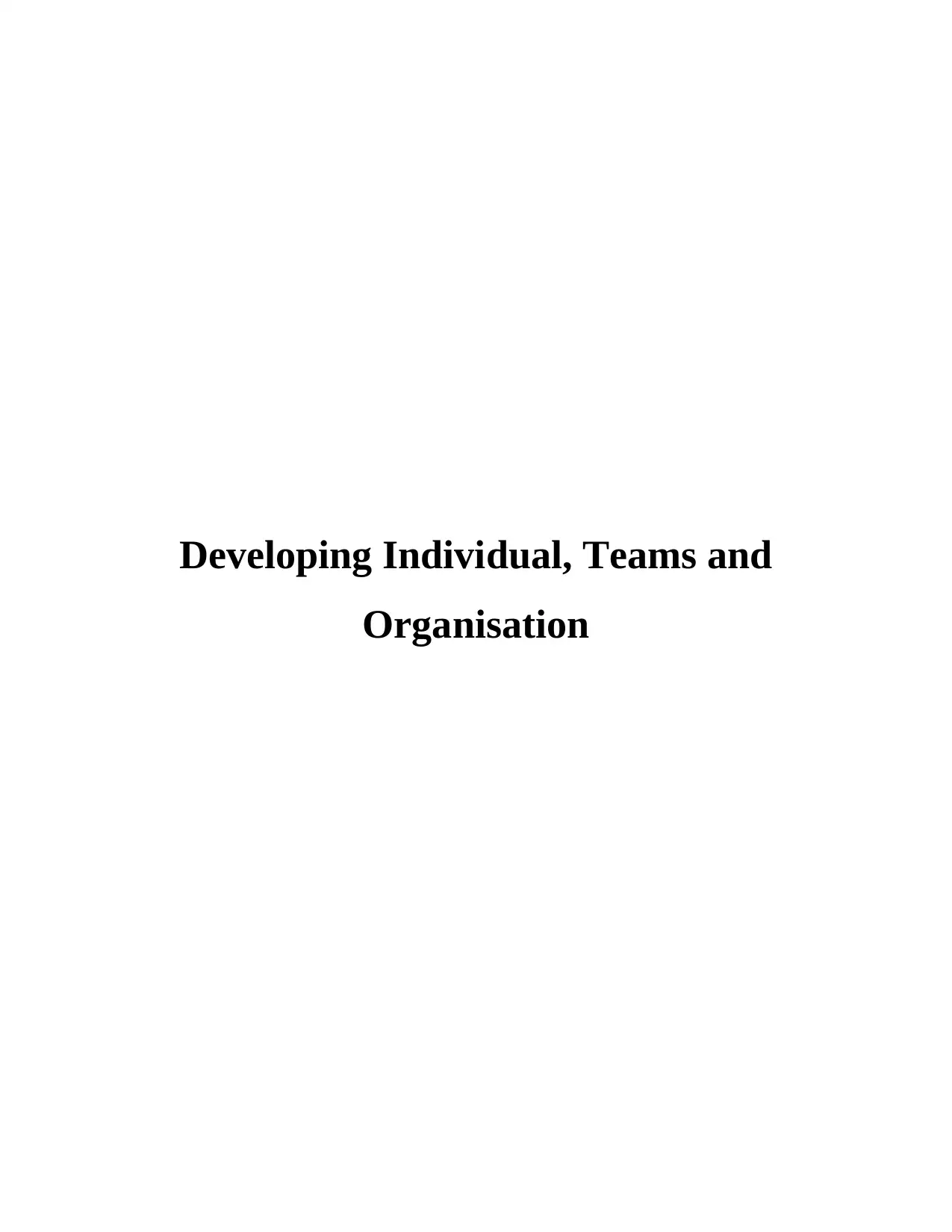
Developing Individual, Teams and
Organisation
Organisation
Paraphrase This Document
Need a fresh take? Get an instant paraphrase of this document with our AI Paraphraser
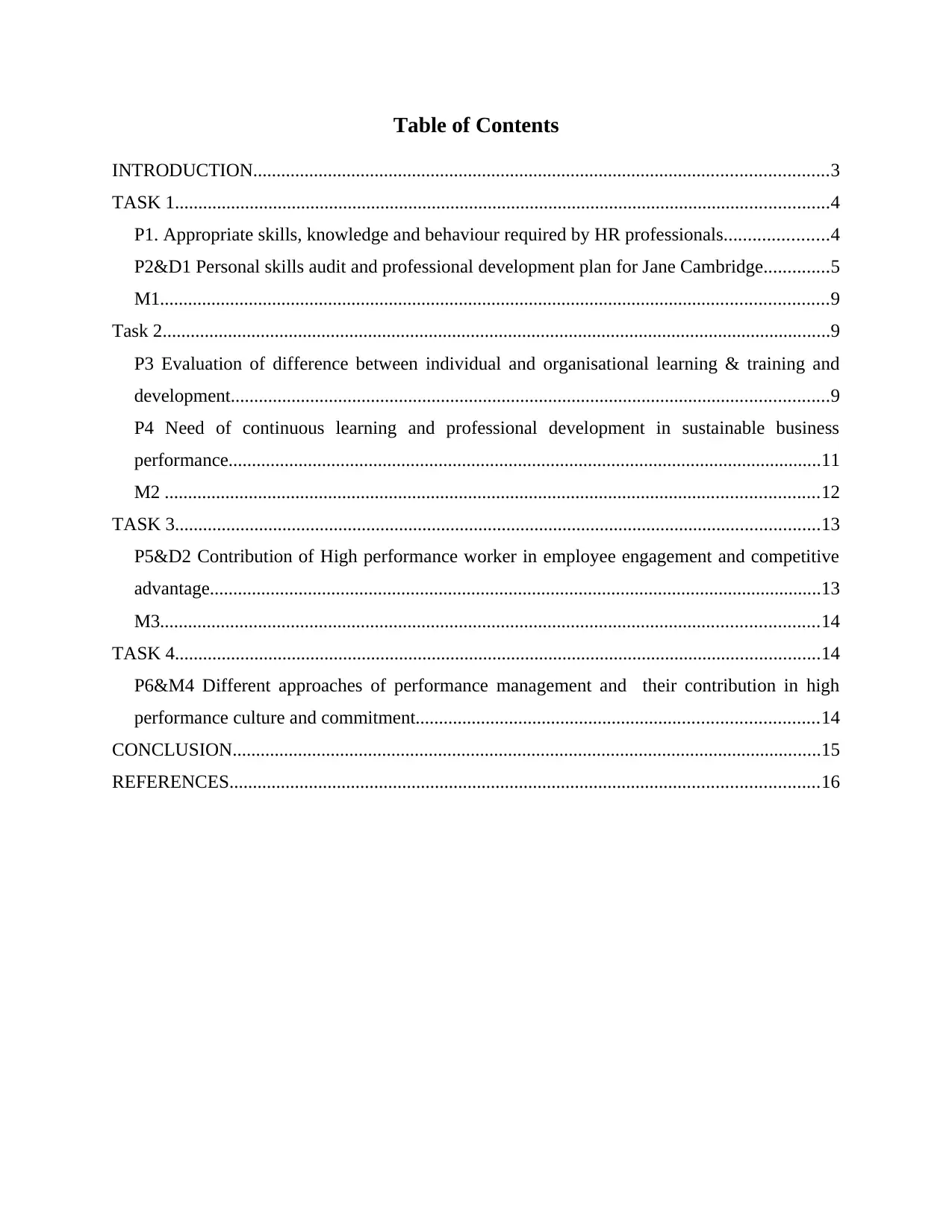
Table of Contents
INTRODUCTION...........................................................................................................................3
TASK 1............................................................................................................................................4
P1. Appropriate skills, knowledge and behaviour required by HR professionals......................4
P2&D1 Personal skills audit and professional development plan for Jane Cambridge..............5
M1...............................................................................................................................................9
Task 2...............................................................................................................................................9
P3 Evaluation of difference between individual and organisational learning & training and
development................................................................................................................................9
P4 Need of continuous learning and professional development in sustainable business
performance...............................................................................................................................11
M2 ............................................................................................................................................12
TASK 3..........................................................................................................................................13
P5&D2 Contribution of High performance worker in employee engagement and competitive
advantage...................................................................................................................................13
M3.............................................................................................................................................14
TASK 4..........................................................................................................................................14
P6&M4 Different approaches of performance management and their contribution in high
performance culture and commitment......................................................................................14
CONCLUSION..............................................................................................................................15
REFERENCES..............................................................................................................................16
INTRODUCTION...........................................................................................................................3
TASK 1............................................................................................................................................4
P1. Appropriate skills, knowledge and behaviour required by HR professionals......................4
P2&D1 Personal skills audit and professional development plan for Jane Cambridge..............5
M1...............................................................................................................................................9
Task 2...............................................................................................................................................9
P3 Evaluation of difference between individual and organisational learning & training and
development................................................................................................................................9
P4 Need of continuous learning and professional development in sustainable business
performance...............................................................................................................................11
M2 ............................................................................................................................................12
TASK 3..........................................................................................................................................13
P5&D2 Contribution of High performance worker in employee engagement and competitive
advantage...................................................................................................................................13
M3.............................................................................................................................................14
TASK 4..........................................................................................................................................14
P6&M4 Different approaches of performance management and their contribution in high
performance culture and commitment......................................................................................14
CONCLUSION..............................................................................................................................15
REFERENCES..............................................................................................................................16
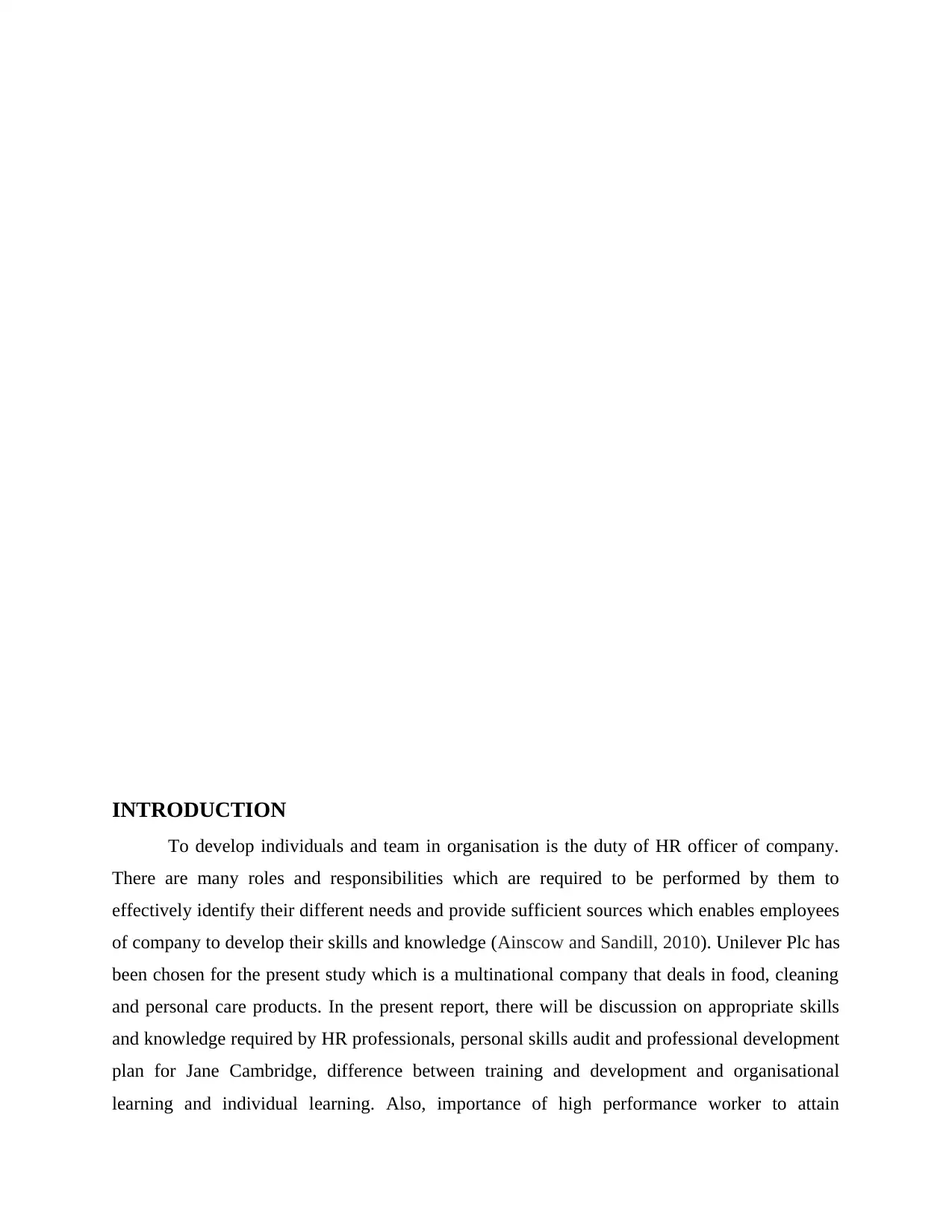
INTRODUCTION
To develop individuals and team in organisation is the duty of HR officer of company.
There are many roles and responsibilities which are required to be performed by them to
effectively identify their different needs and provide sufficient sources which enables employees
of company to develop their skills and knowledge (Ainscow and Sandill, 2010). Unilever Plc has
been chosen for the present study which is a multinational company that deals in food, cleaning
and personal care products. In the present report, there will be discussion on appropriate skills
and knowledge required by HR professionals, personal skills audit and professional development
plan for Jane Cambridge, difference between training and development and organisational
learning and individual learning. Also, importance of high performance worker to attain
To develop individuals and team in organisation is the duty of HR officer of company.
There are many roles and responsibilities which are required to be performed by them to
effectively identify their different needs and provide sufficient sources which enables employees
of company to develop their skills and knowledge (Ainscow and Sandill, 2010). Unilever Plc has
been chosen for the present study which is a multinational company that deals in food, cleaning
and personal care products. In the present report, there will be discussion on appropriate skills
and knowledge required by HR professionals, personal skills audit and professional development
plan for Jane Cambridge, difference between training and development and organisational
learning and individual learning. Also, importance of high performance worker to attain
⊘ This is a preview!⊘
Do you want full access?
Subscribe today to unlock all pages.

Trusted by 1+ million students worldwide
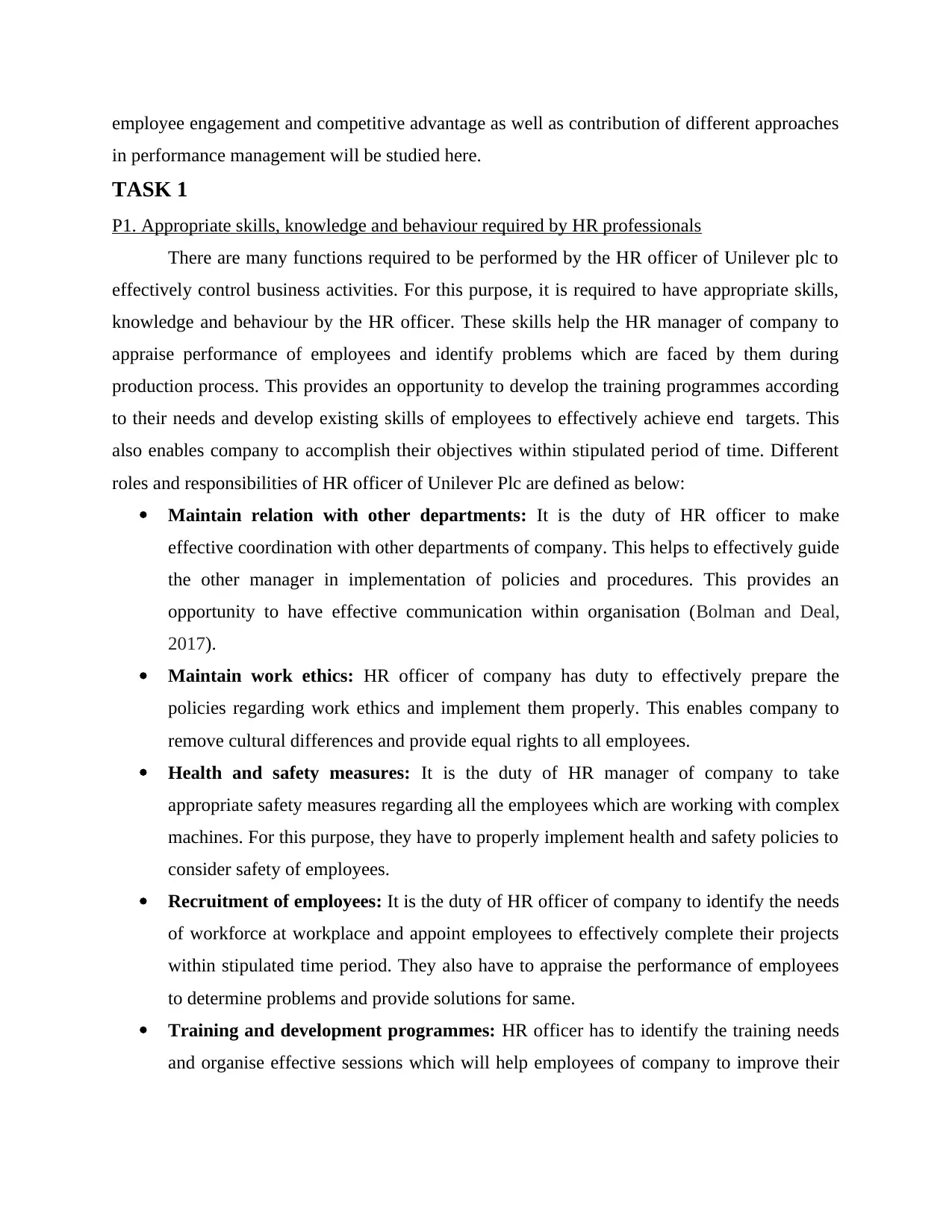
employee engagement and competitive advantage as well as contribution of different approaches
in performance management will be studied here.
TASK 1
P1. Appropriate skills, knowledge and behaviour required by HR professionals
There are many functions required to be performed by the HR officer of Unilever plc to
effectively control business activities. For this purpose, it is required to have appropriate skills,
knowledge and behaviour by the HR officer. These skills help the HR manager of company to
appraise performance of employees and identify problems which are faced by them during
production process. This provides an opportunity to develop the training programmes according
to their needs and develop existing skills of employees to effectively achieve end targets. This
also enables company to accomplish their objectives within stipulated period of time. Different
roles and responsibilities of HR officer of Unilever Plc are defined as below:
Maintain relation with other departments: It is the duty of HR officer to make
effective coordination with other departments of company. This helps to effectively guide
the other manager in implementation of policies and procedures. This provides an
opportunity to have effective communication within organisation (Bolman and Deal,
2017).
Maintain work ethics: HR officer of company has duty to effectively prepare the
policies regarding work ethics and implement them properly. This enables company to
remove cultural differences and provide equal rights to all employees.
Health and safety measures: It is the duty of HR manager of company to take
appropriate safety measures regarding all the employees which are working with complex
machines. For this purpose, they have to properly implement health and safety policies to
consider safety of employees.
Recruitment of employees: It is the duty of HR officer of company to identify the needs
of workforce at workplace and appoint employees to effectively complete their projects
within stipulated time period. They also have to appraise the performance of employees
to determine problems and provide solutions for same.
Training and development programmes: HR officer has to identify the training needs
and organise effective sessions which will help employees of company to improve their
in performance management will be studied here.
TASK 1
P1. Appropriate skills, knowledge and behaviour required by HR professionals
There are many functions required to be performed by the HR officer of Unilever plc to
effectively control business activities. For this purpose, it is required to have appropriate skills,
knowledge and behaviour by the HR officer. These skills help the HR manager of company to
appraise performance of employees and identify problems which are faced by them during
production process. This provides an opportunity to develop the training programmes according
to their needs and develop existing skills of employees to effectively achieve end targets. This
also enables company to accomplish their objectives within stipulated period of time. Different
roles and responsibilities of HR officer of Unilever Plc are defined as below:
Maintain relation with other departments: It is the duty of HR officer to make
effective coordination with other departments of company. This helps to effectively guide
the other manager in implementation of policies and procedures. This provides an
opportunity to have effective communication within organisation (Bolman and Deal,
2017).
Maintain work ethics: HR officer of company has duty to effectively prepare the
policies regarding work ethics and implement them properly. This enables company to
remove cultural differences and provide equal rights to all employees.
Health and safety measures: It is the duty of HR manager of company to take
appropriate safety measures regarding all the employees which are working with complex
machines. For this purpose, they have to properly implement health and safety policies to
consider safety of employees.
Recruitment of employees: It is the duty of HR officer of company to identify the needs
of workforce at workplace and appoint employees to effectively complete their projects
within stipulated time period. They also have to appraise the performance of employees
to determine problems and provide solutions for same.
Training and development programmes: HR officer has to identify the training needs
and organise effective sessions which will help employees of company to improve their
Paraphrase This Document
Need a fresh take? Get an instant paraphrase of this document with our AI Paraphraser
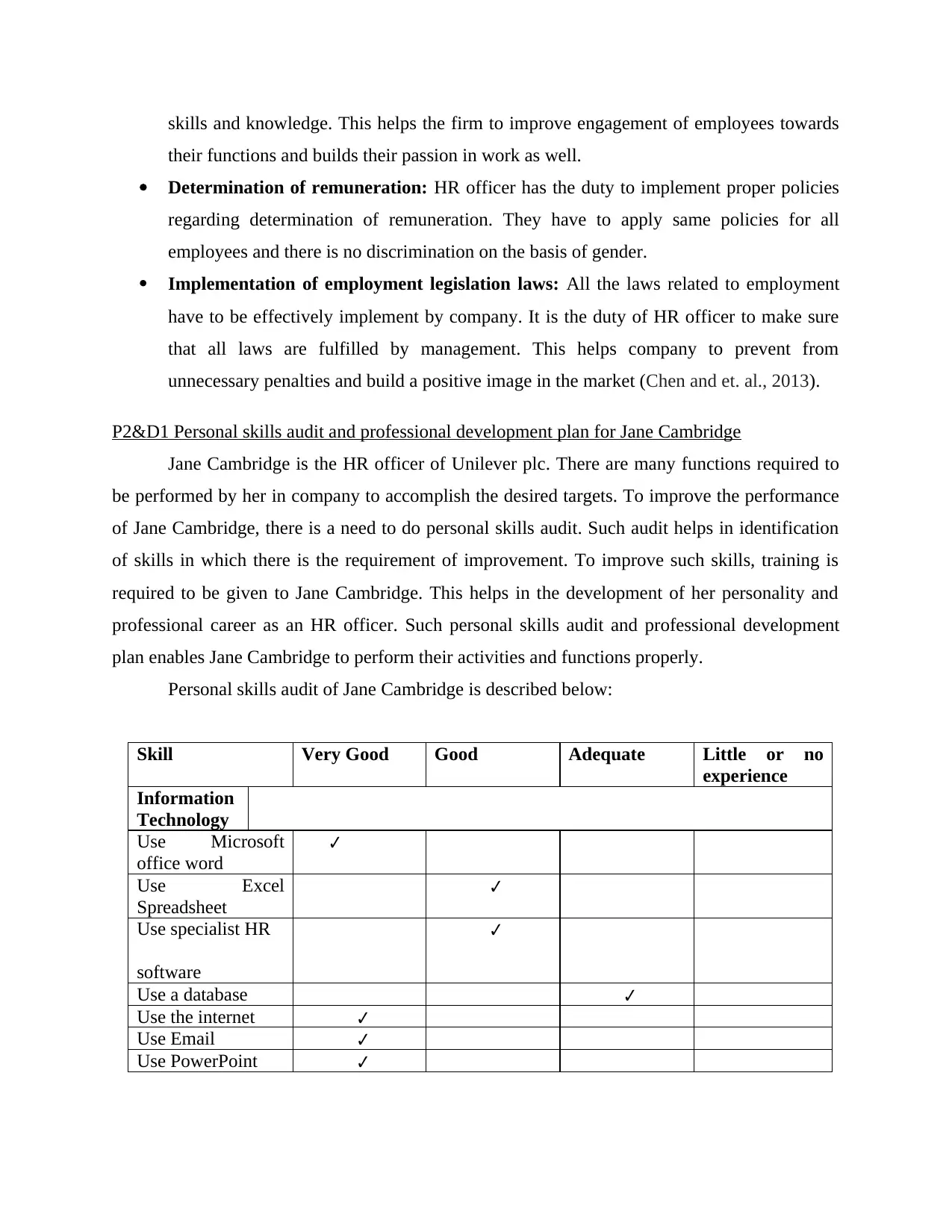
skills and knowledge. This helps the firm to improve engagement of employees towards
their functions and builds their passion in work as well.
Determination of remuneration: HR officer has the duty to implement proper policies
regarding determination of remuneration. They have to apply same policies for all
employees and there is no discrimination on the basis of gender.
Implementation of employment legislation laws: All the laws related to employment
have to be effectively implement by company. It is the duty of HR officer to make sure
that all laws are fulfilled by management. This helps company to prevent from
unnecessary penalties and build a positive image in the market (Chen and et. al., 2013).
P2&D1 Personal skills audit and professional development plan for Jane Cambridge
Jane Cambridge is the HR officer of Unilever plc. There are many functions required to
be performed by her in company to accomplish the desired targets. To improve the performance
of Jane Cambridge, there is a need to do personal skills audit. Such audit helps in identification
of skills in which there is the requirement of improvement. To improve such skills, training is
required to be given to Jane Cambridge. This helps in the development of her personality and
professional career as an HR officer. Such personal skills audit and professional development
plan enables Jane Cambridge to perform their activities and functions properly.
Personal skills audit of Jane Cambridge is described below:
Skill Very Good Good Adequate Little or no
experience
Information
Technology
Use Microsoft
office word
✔
Use Excel
Spreadsheet
✔
Use specialist HR
software
✔
Use a database ✔
Use the internet ✔
Use Email ✔
Use PowerPoint ✔
their functions and builds their passion in work as well.
Determination of remuneration: HR officer has the duty to implement proper policies
regarding determination of remuneration. They have to apply same policies for all
employees and there is no discrimination on the basis of gender.
Implementation of employment legislation laws: All the laws related to employment
have to be effectively implement by company. It is the duty of HR officer to make sure
that all laws are fulfilled by management. This helps company to prevent from
unnecessary penalties and build a positive image in the market (Chen and et. al., 2013).
P2&D1 Personal skills audit and professional development plan for Jane Cambridge
Jane Cambridge is the HR officer of Unilever plc. There are many functions required to
be performed by her in company to accomplish the desired targets. To improve the performance
of Jane Cambridge, there is a need to do personal skills audit. Such audit helps in identification
of skills in which there is the requirement of improvement. To improve such skills, training is
required to be given to Jane Cambridge. This helps in the development of her personality and
professional career as an HR officer. Such personal skills audit and professional development
plan enables Jane Cambridge to perform their activities and functions properly.
Personal skills audit of Jane Cambridge is described below:
Skill Very Good Good Adequate Little or no
experience
Information
Technology
Use Microsoft
office word
✔
Use Excel
Spreadsheet
✔
Use specialist HR
software
✔
Use a database ✔
Use the internet ✔
Use Email ✔
Use PowerPoint ✔
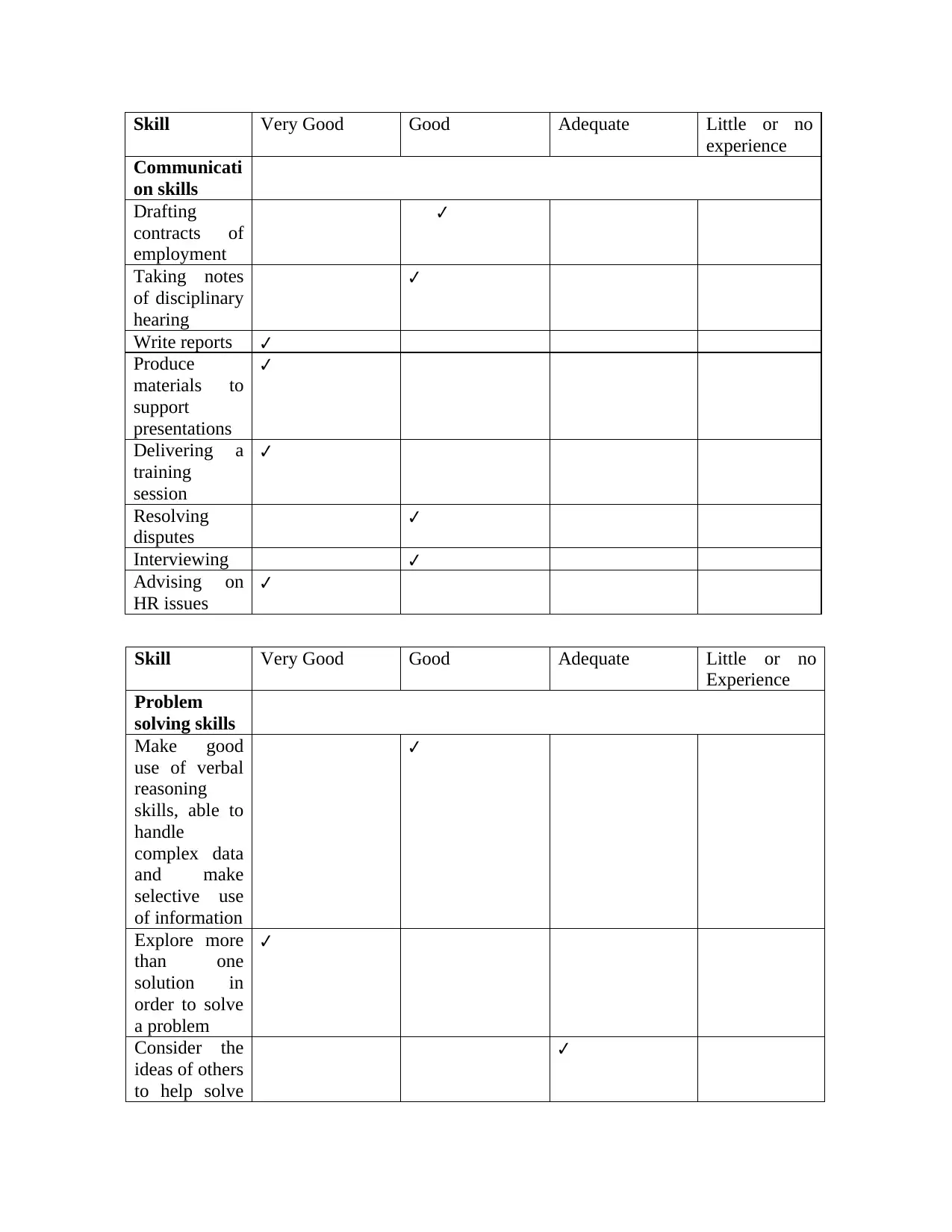
Skill Very Good Good Adequate Little or no
experience
Communicati
on skills
Drafting
contracts of
employment
✔
Taking notes
of disciplinary
hearing
✔
Write reports ✔
Produce
materials to
support
presentations
✔
Delivering a
training
session
✔
Resolving
disputes
✔
Interviewing ✔
Advising on
HR issues
✔
Skill Very Good Good Adequate Little or no
Experience
Problem
solving skills
Make good
use of verbal
reasoning
skills, able to
handle
complex data
and make
selective use
of information
✔
Explore more
than one
solution in
order to solve
a problem
✔
Consider the
ideas of others
to help solve
✔
experience
Communicati
on skills
Drafting
contracts of
employment
✔
Taking notes
of disciplinary
hearing
✔
Write reports ✔
Produce
materials to
support
presentations
✔
Delivering a
training
session
✔
Resolving
disputes
✔
Interviewing ✔
Advising on
HR issues
✔
Skill Very Good Good Adequate Little or no
Experience
Problem
solving skills
Make good
use of verbal
reasoning
skills, able to
handle
complex data
and make
selective use
of information
✔
Explore more
than one
solution in
order to solve
a problem
✔
Consider the
ideas of others
to help solve
✔
⊘ This is a preview!⊘
Do you want full access?
Subscribe today to unlock all pages.

Trusted by 1+ million students worldwide
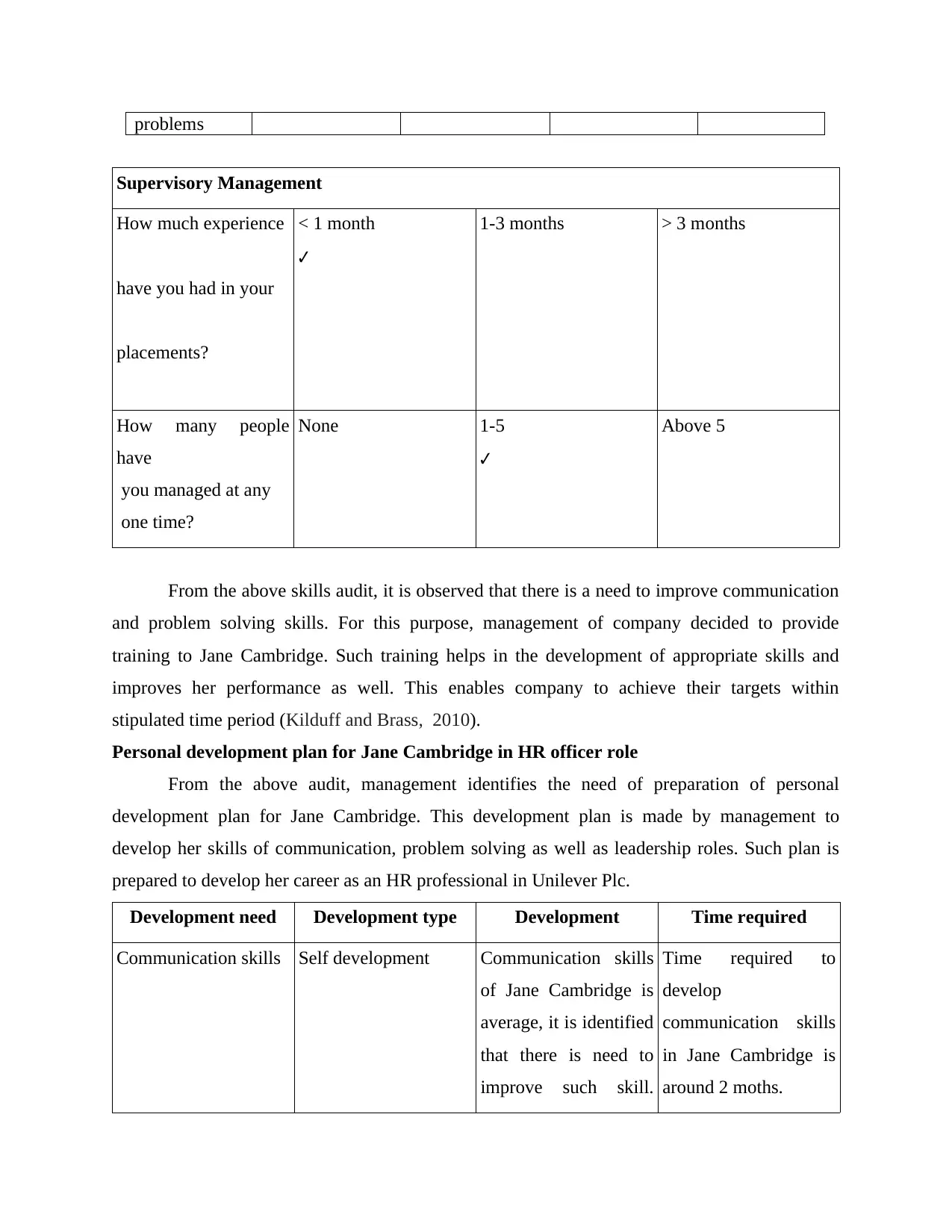
problems
Supervisory Management
How much experience
have you had in your
placements?
< 1 month
✔
1-3 months > 3 months
How many people
have
you managed at any
one time?
None 1-5
✔
Above 5
From the above skills audit, it is observed that there is a need to improve communication
and problem solving skills. For this purpose, management of company decided to provide
training to Jane Cambridge. Such training helps in the development of appropriate skills and
improves her performance as well. This enables company to achieve their targets within
stipulated time period (Kilduff and Brass, 2010).
Personal development plan for Jane Cambridge in HR officer role
From the above audit, management identifies the need of preparation of personal
development plan for Jane Cambridge. This development plan is made by management to
develop her skills of communication, problem solving as well as leadership roles. Such plan is
prepared to develop her career as an HR professional in Unilever Plc.
Development need Development type Development Time required
Communication skills Self development Communication skills
of Jane Cambridge is
average, it is identified
that there is need to
improve such skill.
Time required to
develop
communication skills
in Jane Cambridge is
around 2 moths.
Supervisory Management
How much experience
have you had in your
placements?
< 1 month
✔
1-3 months > 3 months
How many people
have
you managed at any
one time?
None 1-5
✔
Above 5
From the above skills audit, it is observed that there is a need to improve communication
and problem solving skills. For this purpose, management of company decided to provide
training to Jane Cambridge. Such training helps in the development of appropriate skills and
improves her performance as well. This enables company to achieve their targets within
stipulated time period (Kilduff and Brass, 2010).
Personal development plan for Jane Cambridge in HR officer role
From the above audit, management identifies the need of preparation of personal
development plan for Jane Cambridge. This development plan is made by management to
develop her skills of communication, problem solving as well as leadership roles. Such plan is
prepared to develop her career as an HR professional in Unilever Plc.
Development need Development type Development Time required
Communication skills Self development Communication skills
of Jane Cambridge is
average, it is identified
that there is need to
improve such skill.
Time required to
develop
communication skills
in Jane Cambridge is
around 2 moths.
Paraphrase This Document
Need a fresh take? Get an instant paraphrase of this document with our AI Paraphraser
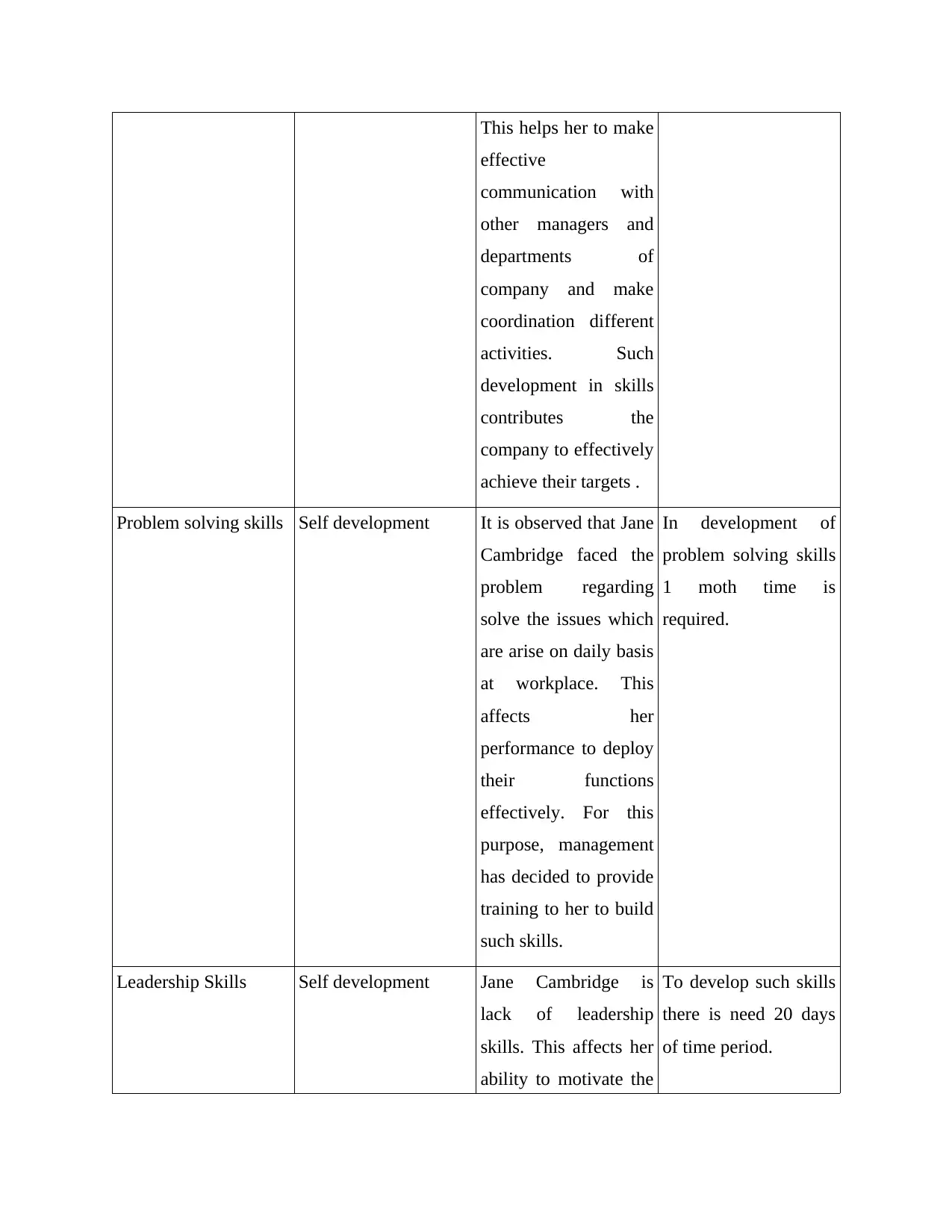
This helps her to make
effective
communication with
other managers and
departments of
company and make
coordination different
activities. Such
development in skills
contributes the
company to effectively
achieve their targets .
Problem solving skills Self development It is observed that Jane
Cambridge faced the
problem regarding
solve the issues which
are arise on daily basis
at workplace. This
affects her
performance to deploy
their functions
effectively. For this
purpose, management
has decided to provide
training to her to build
such skills.
In development of
problem solving skills
1 moth time is
required.
Leadership Skills Self development Jane Cambridge is
lack of leadership
skills. This affects her
ability to motivate the
To develop such skills
there is need 20 days
of time period.
effective
communication with
other managers and
departments of
company and make
coordination different
activities. Such
development in skills
contributes the
company to effectively
achieve their targets .
Problem solving skills Self development It is observed that Jane
Cambridge faced the
problem regarding
solve the issues which
are arise on daily basis
at workplace. This
affects her
performance to deploy
their functions
effectively. For this
purpose, management
has decided to provide
training to her to build
such skills.
In development of
problem solving skills
1 moth time is
required.
Leadership Skills Self development Jane Cambridge is
lack of leadership
skills. This affects her
ability to motivate the
To develop such skills
there is need 20 days
of time period.
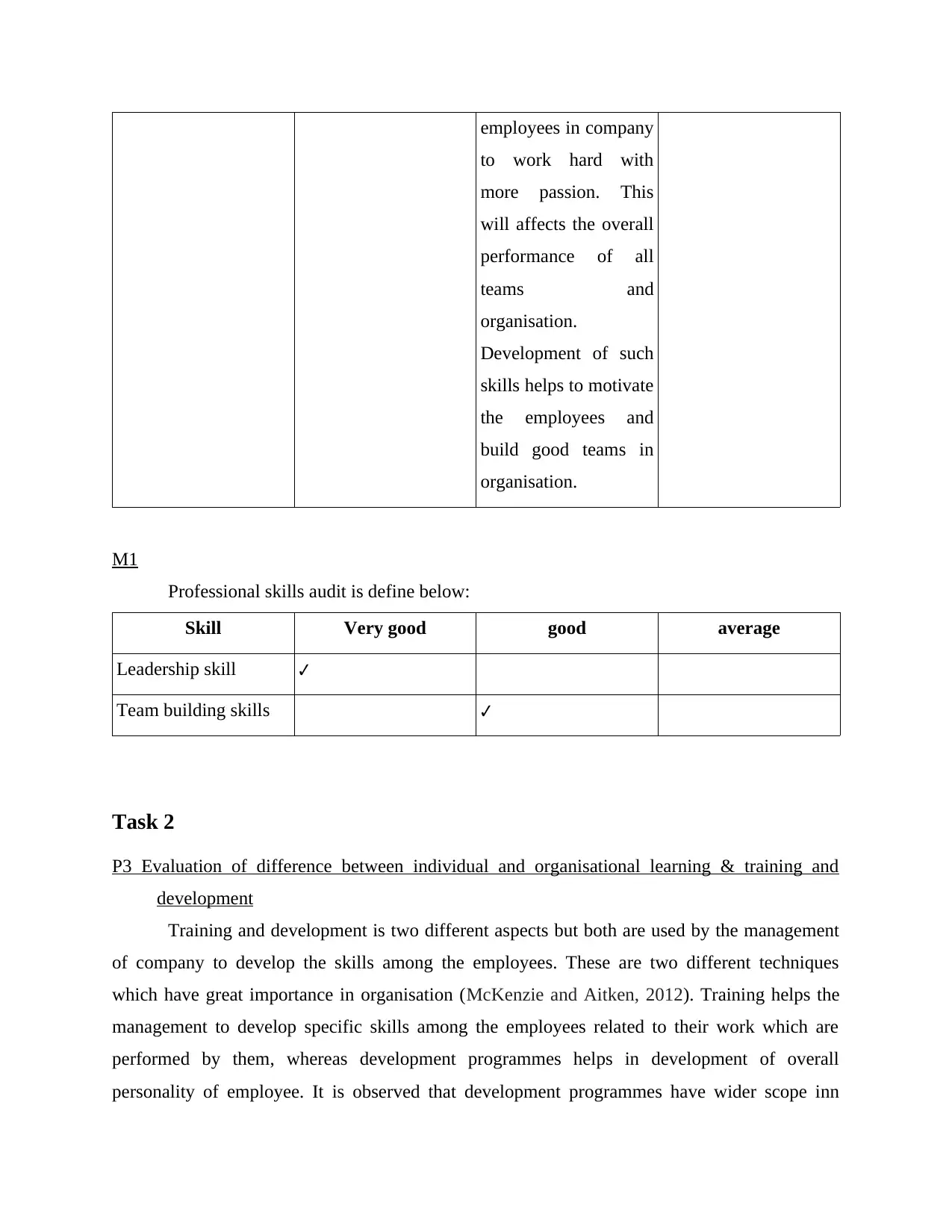
employees in company
to work hard with
more passion. This
will affects the overall
performance of all
teams and
organisation.
Development of such
skills helps to motivate
the employees and
build good teams in
organisation.
M1
Professional skills audit is define below:
Skill Very good good average
Leadership skill ✔
Team building skills ✔
Task 2
P3 Evaluation of difference between individual and organisational learning & training and
development
Training and development is two different aspects but both are used by the management
of company to develop the skills among the employees. These are two different techniques
which have great importance in organisation (McKenzie and Aitken, 2012). Training helps the
management to develop specific skills among the employees related to their work which are
performed by them, whereas development programmes helps in development of overall
personality of employee. It is observed that development programmes have wider scope inn
to work hard with
more passion. This
will affects the overall
performance of all
teams and
organisation.
Development of such
skills helps to motivate
the employees and
build good teams in
organisation.
M1
Professional skills audit is define below:
Skill Very good good average
Leadership skill ✔
Team building skills ✔
Task 2
P3 Evaluation of difference between individual and organisational learning & training and
development
Training and development is two different aspects but both are used by the management
of company to develop the skills among the employees. These are two different techniques
which have great importance in organisation (McKenzie and Aitken, 2012). Training helps the
management to develop specific skills among the employees related to their work which are
performed by them, whereas development programmes helps in development of overall
personality of employee. It is observed that development programmes have wider scope inn
⊘ This is a preview!⊘
Do you want full access?
Subscribe today to unlock all pages.

Trusted by 1+ million students worldwide
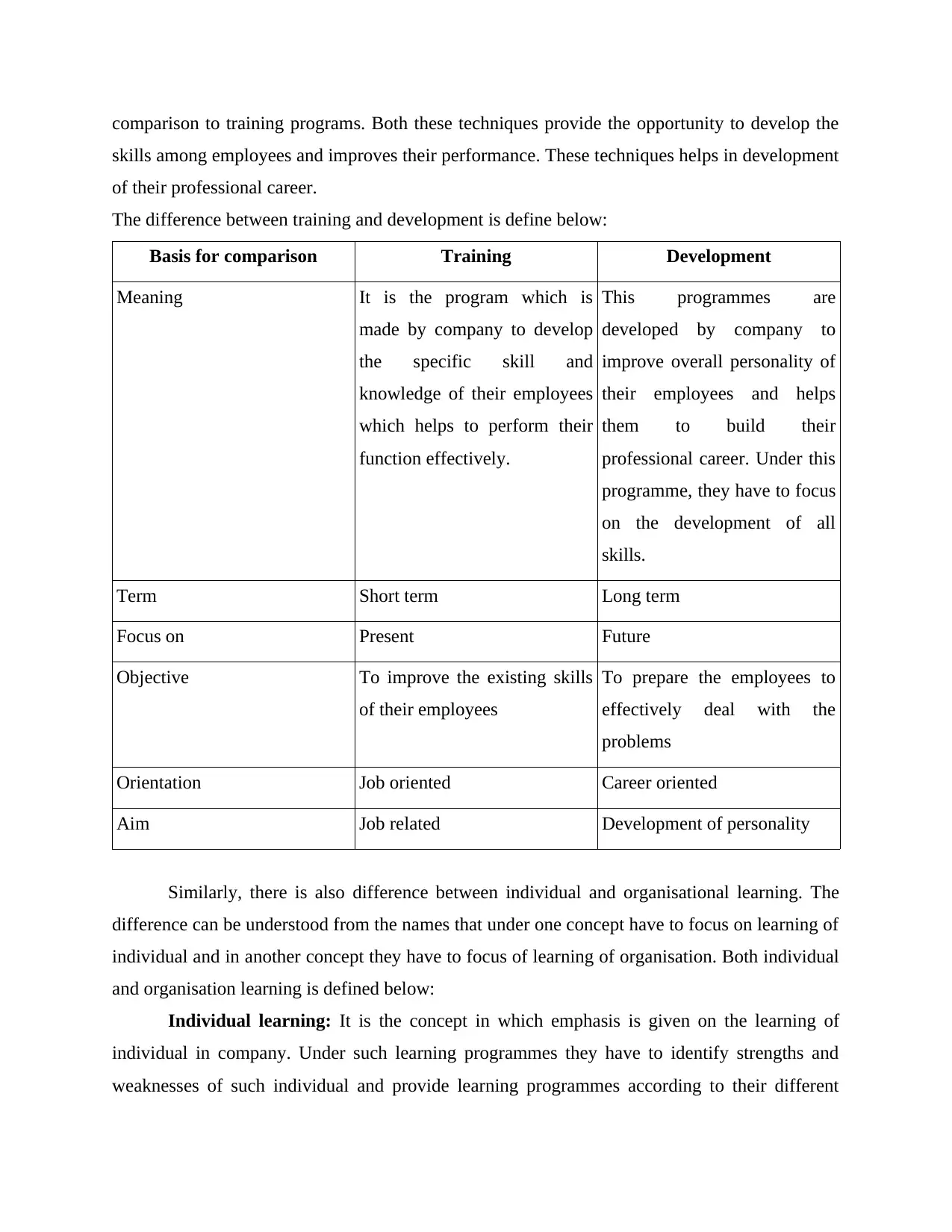
comparison to training programs. Both these techniques provide the opportunity to develop the
skills among employees and improves their performance. These techniques helps in development
of their professional career.
The difference between training and development is define below:
Basis for comparison Training Development
Meaning It is the program which is
made by company to develop
the specific skill and
knowledge of their employees
which helps to perform their
function effectively.
This programmes are
developed by company to
improve overall personality of
their employees and helps
them to build their
professional career. Under this
programme, they have to focus
on the development of all
skills.
Term Short term Long term
Focus on Present Future
Objective To improve the existing skills
of their employees
To prepare the employees to
effectively deal with the
problems
Orientation Job oriented Career oriented
Aim Job related Development of personality
Similarly, there is also difference between individual and organisational learning. The
difference can be understood from the names that under one concept have to focus on learning of
individual and in another concept they have to focus of learning of organisation. Both individual
and organisation learning is defined below:
Individual learning: It is the concept in which emphasis is given on the learning of
individual in company. Under such learning programmes they have to identify strengths and
weaknesses of such individual and provide learning programmes according to their different
skills among employees and improves their performance. These techniques helps in development
of their professional career.
The difference between training and development is define below:
Basis for comparison Training Development
Meaning It is the program which is
made by company to develop
the specific skill and
knowledge of their employees
which helps to perform their
function effectively.
This programmes are
developed by company to
improve overall personality of
their employees and helps
them to build their
professional career. Under this
programme, they have to focus
on the development of all
skills.
Term Short term Long term
Focus on Present Future
Objective To improve the existing skills
of their employees
To prepare the employees to
effectively deal with the
problems
Orientation Job oriented Career oriented
Aim Job related Development of personality
Similarly, there is also difference between individual and organisational learning. The
difference can be understood from the names that under one concept have to focus on learning of
individual and in another concept they have to focus of learning of organisation. Both individual
and organisation learning is defined below:
Individual learning: It is the concept in which emphasis is given on the learning of
individual in company. Under such learning programmes they have to identify strengths and
weaknesses of such individual and provide learning programmes according to their different
Paraphrase This Document
Need a fresh take? Get an instant paraphrase of this document with our AI Paraphraser
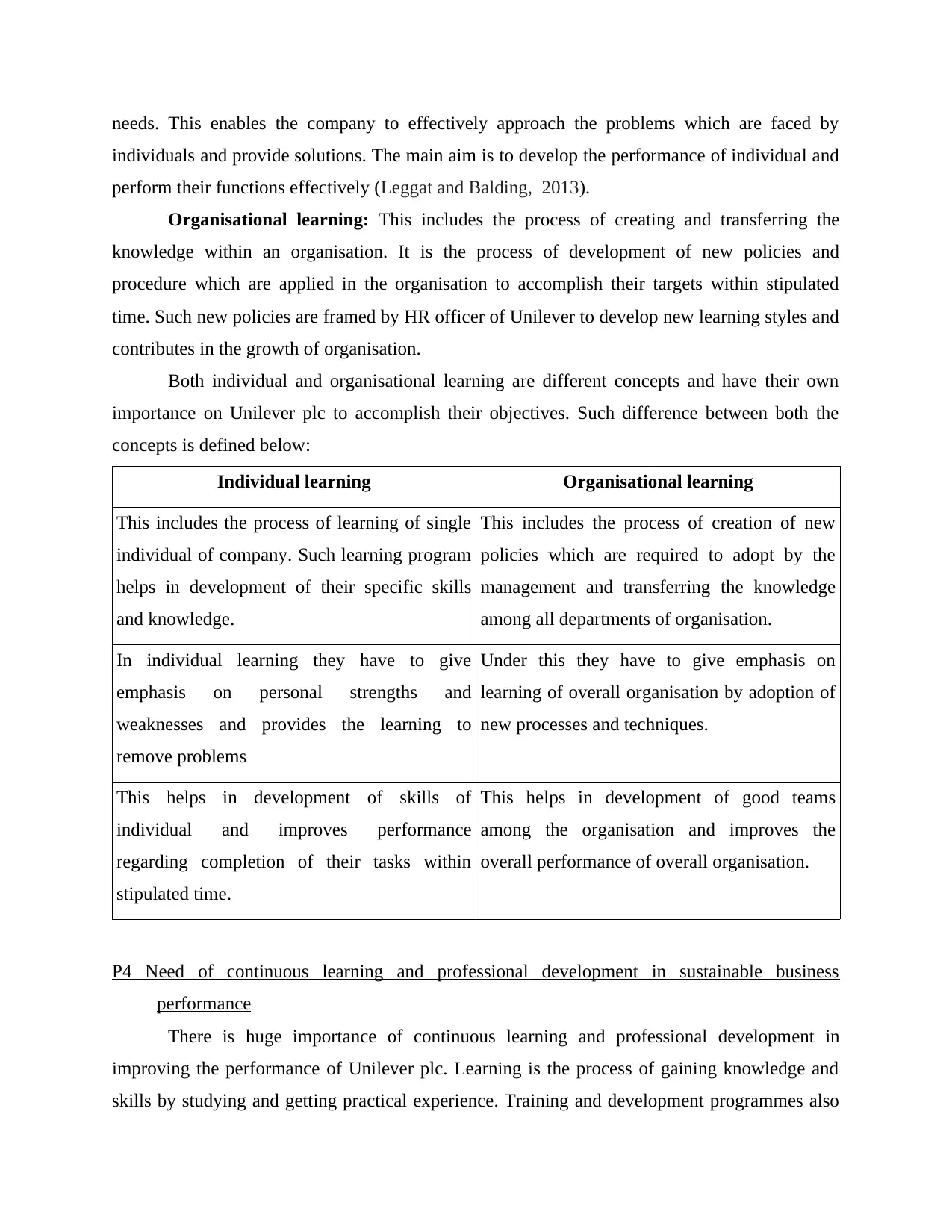
needs. This enables the company to effectively approach the problems which are faced by
individuals and provide solutions. The main aim is to develop the performance of individual and
perform their functions effectively (Leggat and Balding, 2013).
Organisational learning: This includes the process of creating and transferring the
knowledge within an organisation. It is the process of development of new policies and
procedure which are applied in the organisation to accomplish their targets within stipulated
time. Such new policies are framed by HR officer of Unilever to develop new learning styles and
contributes in the growth of organisation.
Both individual and organisational learning are different concepts and have their own
importance on Unilever plc to accomplish their objectives. Such difference between both the
concepts is defined below:
Individual learning Organisational learning
This includes the process of learning of single
individual of company. Such learning program
helps in development of their specific skills
and knowledge.
This includes the process of creation of new
policies which are required to adopt by the
management and transferring the knowledge
among all departments of organisation.
In individual learning they have to give
emphasis on personal strengths and
weaknesses and provides the learning to
remove problems
Under this they have to give emphasis on
learning of overall organisation by adoption of
new processes and techniques.
This helps in development of skills of
individual and improves performance
regarding completion of their tasks within
stipulated time.
This helps in development of good teams
among the organisation and improves the
overall performance of overall organisation.
P4 Need of continuous learning and professional development in sustainable business
performance
There is huge importance of continuous learning and professional development in
improving the performance of Unilever plc. Learning is the process of gaining knowledge and
skills by studying and getting practical experience. Training and development programmes also
individuals and provide solutions. The main aim is to develop the performance of individual and
perform their functions effectively (Leggat and Balding, 2013).
Organisational learning: This includes the process of creating and transferring the
knowledge within an organisation. It is the process of development of new policies and
procedure which are applied in the organisation to accomplish their targets within stipulated
time. Such new policies are framed by HR officer of Unilever to develop new learning styles and
contributes in the growth of organisation.
Both individual and organisational learning are different concepts and have their own
importance on Unilever plc to accomplish their objectives. Such difference between both the
concepts is defined below:
Individual learning Organisational learning
This includes the process of learning of single
individual of company. Such learning program
helps in development of their specific skills
and knowledge.
This includes the process of creation of new
policies which are required to adopt by the
management and transferring the knowledge
among all departments of organisation.
In individual learning they have to give
emphasis on personal strengths and
weaknesses and provides the learning to
remove problems
Under this they have to give emphasis on
learning of overall organisation by adoption of
new processes and techniques.
This helps in development of skills of
individual and improves performance
regarding completion of their tasks within
stipulated time.
This helps in development of good teams
among the organisation and improves the
overall performance of overall organisation.
P4 Need of continuous learning and professional development in sustainable business
performance
There is huge importance of continuous learning and professional development in
improving the performance of Unilever plc. Learning is the process of gaining knowledge and
skills by studying and getting practical experience. Training and development programmes also
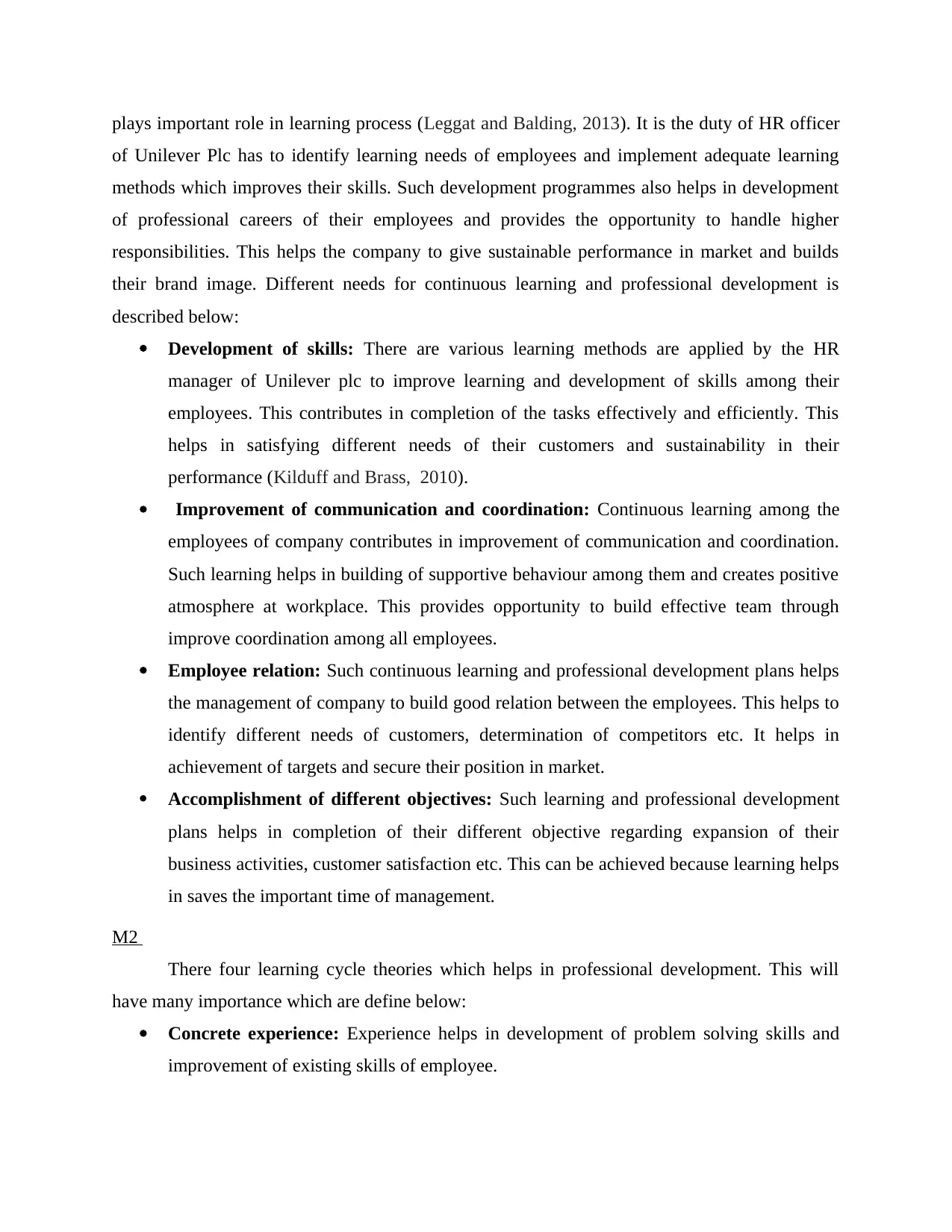
plays important role in learning process (Leggat and Balding, 2013). It is the duty of HR officer
of Unilever Plc has to identify learning needs of employees and implement adequate learning
methods which improves their skills. Such development programmes also helps in development
of professional careers of their employees and provides the opportunity to handle higher
responsibilities. This helps the company to give sustainable performance in market and builds
their brand image. Different needs for continuous learning and professional development is
described below:
Development of skills: There are various learning methods are applied by the HR
manager of Unilever plc to improve learning and development of skills among their
employees. This contributes in completion of the tasks effectively and efficiently. This
helps in satisfying different needs of their customers and sustainability in their
performance (Kilduff and Brass, 2010).
Improvement of communication and coordination: Continuous learning among the
employees of company contributes in improvement of communication and coordination.
Such learning helps in building of supportive behaviour among them and creates positive
atmosphere at workplace. This provides opportunity to build effective team through
improve coordination among all employees.
Employee relation: Such continuous learning and professional development plans helps
the management of company to build good relation between the employees. This helps to
identify different needs of customers, determination of competitors etc. It helps in
achievement of targets and secure their position in market.
Accomplishment of different objectives: Such learning and professional development
plans helps in completion of their different objective regarding expansion of their
business activities, customer satisfaction etc. This can be achieved because learning helps
in saves the important time of management.
M2
There four learning cycle theories which helps in professional development. This will
have many importance which are define below:
Concrete experience: Experience helps in development of problem solving skills and
improvement of existing skills of employee.
of Unilever Plc has to identify learning needs of employees and implement adequate learning
methods which improves their skills. Such development programmes also helps in development
of professional careers of their employees and provides the opportunity to handle higher
responsibilities. This helps the company to give sustainable performance in market and builds
their brand image. Different needs for continuous learning and professional development is
described below:
Development of skills: There are various learning methods are applied by the HR
manager of Unilever plc to improve learning and development of skills among their
employees. This contributes in completion of the tasks effectively and efficiently. This
helps in satisfying different needs of their customers and sustainability in their
performance (Kilduff and Brass, 2010).
Improvement of communication and coordination: Continuous learning among the
employees of company contributes in improvement of communication and coordination.
Such learning helps in building of supportive behaviour among them and creates positive
atmosphere at workplace. This provides opportunity to build effective team through
improve coordination among all employees.
Employee relation: Such continuous learning and professional development plans helps
the management of company to build good relation between the employees. This helps to
identify different needs of customers, determination of competitors etc. It helps in
achievement of targets and secure their position in market.
Accomplishment of different objectives: Such learning and professional development
plans helps in completion of their different objective regarding expansion of their
business activities, customer satisfaction etc. This can be achieved because learning helps
in saves the important time of management.
M2
There four learning cycle theories which helps in professional development. This will
have many importance which are define below:
Concrete experience: Experience helps in development of problem solving skills and
improvement of existing skills of employee.
⊘ This is a preview!⊘
Do you want full access?
Subscribe today to unlock all pages.

Trusted by 1+ million students worldwide
1 out of 17
Related Documents
Your All-in-One AI-Powered Toolkit for Academic Success.
+13062052269
info@desklib.com
Available 24*7 on WhatsApp / Email
![[object Object]](/_next/static/media/star-bottom.7253800d.svg)
Unlock your academic potential
Copyright © 2020–2026 A2Z Services. All Rights Reserved. Developed and managed by ZUCOL.





